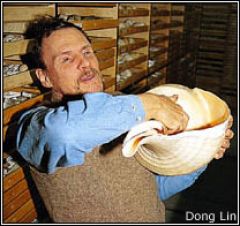Grade Level(s):
- 9-12
- Advanced
- General
Source:
- California Academy of Sciences
Resource type:
- Interview with Scientist
Time: 20-30 minutes
Overview
This interview with MacArthur Fellow and paleobiologist, Geerat Vermeij, covers much ground, including adaptations in the mollusks he studies, evolutionary arms races, punctuated equilibrium, extinctions, macroevolution, and the value of diversity.

- [History of life: Grades 9-12] Rates of evolution vary.
- [Evidence of evolution: Grades 9-12] There is a fit between organisms and their environments, though not always a perfect fit. (LS4.C)
- [Mechanisms of evolution: Grades 9-12] Traits that confer an advantage may persist in the population and are called adaptations. (LS4.B, LS4.C)
- [Nature of science: Grades 9-12] Scientific knowledge is open to question and revision as we come up with new ideas and discover new evidence. (P4, P6, NOS3)
- [Nature of science: Grades 9-12] Scientists test their ideas using multiple lines of evidence. (P6, NOS2)
- [Nature of science: Grades 9-12] Scientists can test ideas about events and processes long past, very distant, and not directly observable.
- [Nature of science: Grades 9-12] The real process of science is complex, iterative, and can take many different paths.
- [Nature of science: Grades 9-12] Science is a human endeavor. (NOS7)
- Disciplinary Core Idea LS4.B: Natural Selection
- Disciplinary Core Idea LS4.C: Adaptation
- NOS Matrix understanding category 2. Scientific knowledge is based on empirical evidence.
- NOS Matrix understanding category 3. Scientific knowledge is open to revision in light of new evidence.
- NOS Matrix understanding category 7. Science is a human endeavor.
- Science and Engineering Practice 4. Analyzing and interpreting data
- Science and Engineering Practice 6. Constructing explanations and designing solutions
The writing level of this piece is fairly advanced. This article doesn't go into much detail on the concepts it touches; however, it would make a great capstone or kick-off reading for a lesson on natural selection and arms races. Student learning on the topics covered by this interview may be enhanced by class discussion.
